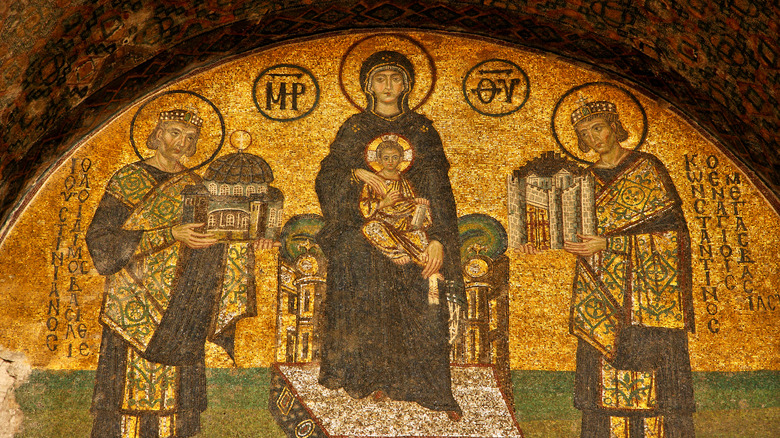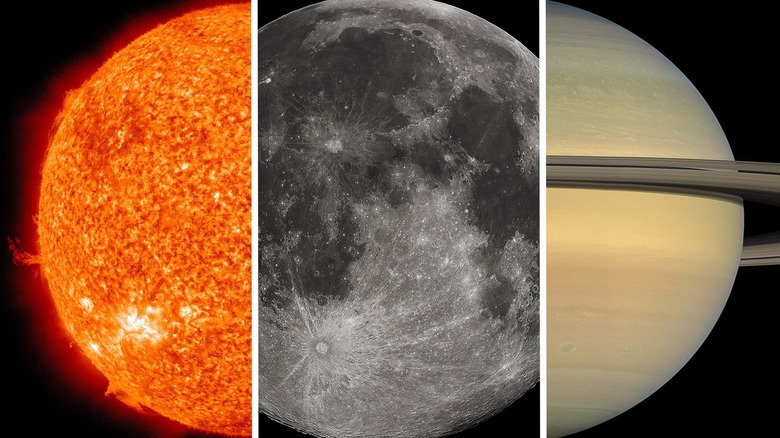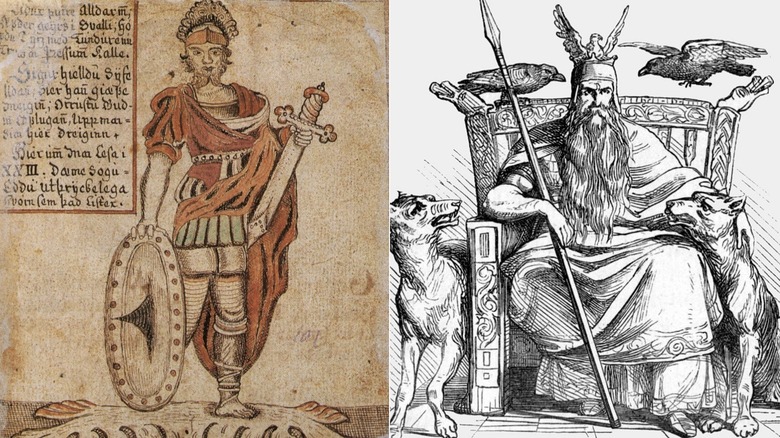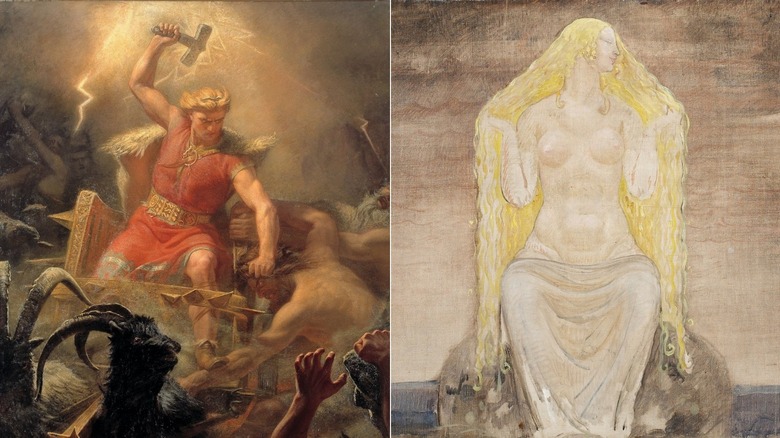How The Days Of The Week Got Their Names
Sunday. Monday. Tuesday. Wednesday. Thursday. Friday. Saturday. You've probably said each of these words — in this exact sequence — hundreds of times since you turned five. But have you ever stopped to wonder where these words actually come from? Take a word like Wednesday. To any English speaker, the word's meaning is clear: the day in the middle of the week. But ask yourself: How did we ever get stuck calling that day something so clunky as Wednesday?
As it turns out, the seven days of the week have a fascinating (and complicated) history rooted in Latin, Old English, heavenly bodies, and Germanic mythology. But, before diving into that, a simpler question: Why does a week have seven days in the first place?
According to LiveScience, the seven-day week has its origins in the calendars of the ancient Babylonians, and before them, the ancient Sumerians. The seven-day week is based on the lunar cycle; it takes roughly seven days for the Moon to transition from one of its states (e.g. "full") to the next (e.g. "waning half").
That explains why we follow a seven-day week. But if we want to trace the origins of the names of the days of the week, then the Roman Empire is the best place to look. LiveScience explains that early Rome followed an eight-day calendar week. In this so-called "nundinal cycle," days had letter labels from A to H. But, in 321 A.D., Emperor Constantine converted the Roman calendar to the seven-day week.
The days of the week have their roots in Roman tradition
While Constantine's switch to the seven-day week was a big shift — one that aided Rome in its transition to Christianity — Rome was actually fairly late to the calendrical party. Discover Magazine reports that Jews, Persians, Greeks, and others had all already adopted a seven-day week, likely as a domino effect from the original influence of the Babylonians.
But Rome, of course, wanted to put its own Roman spin on the seven-day week. So, it named each of the seven days after the seven celestial bodies known to Rome at the time — most of which, in turn, had been named after Roman deities. Per LiveScience, in Sunday-to-Saturday order, Rome's seven days were named Dies Solis ("Sun's Day"), Dies Lunae ("Moon's Day"), Dies Martis ("Mars' Day"), Dies Mercurii ("Mercury's Day"), Dies Jovis ("Jupiter's Day"), Dies Veneris ("Venus' Day"), and Dies Saturni ("Saturn's Day"). Today, most Romance languages still use some variation of these names. If you speak Spanish, for example, you might recognize the similarities.
English, on the other hand, is a Germanic language, so we don't have such obvious roots in Latin. As LiveScience explains, the Germanic peoples of northern Europe did adopt Rome's seven-day week, but renamed each day according to Germanic mythology. (By the way, you're probably more used to hearing Germanic mythology referred to as "Norse mythology." But, as Encyclopedia.com explains, Norse mythology is just a subset of Germanic mythology, albeit the best-known and best-preserved subset.)
Sunday, Monday, and Saturday are named after celestial bodies
In Old English — the Germanic language that would ultimately become modern English — three days of the week retained the celestial connection given to them by the Roman Empire. While skimming the list of Roman days of the week, you probably recognized the three: Dies Solis ("Sun's Day"), Dies Lunae ("Moon's Day"), and Dies Saturni ("Saturn's Day").
Per LiveScience, Dies Solis was translated into Old English as "Sunnandæg." Like the original Latin term, Sunnandæg also means "Sun's day." And, like Latin, the day was named for both the celestial object and the related deity; in Germanic mythology, the Sun was personified by a goddess named Sunna. Sunnandæg entered modern English as "Sunday."
Similarly, Dies Lunae became "Monandæg" in Old English. As with the Romans, this day was named for the Moon, which was personified in Germanic mythology by the deity Mani. In modern English, Monandæg became "Monday." The final day of the week is the biggest ripoff of Roman culture. Rather than renaming Dies Saturni after one of their own deities, speakers of Old English kept the day's ties to the Roman god (and planet) Saturn. Hence, they called the day "Sæturnesdæg," which entered modern English as "Saturday."
That's a lot of steps involving multiple languages, deities, and celestial bodies. All you really need to remember is that Sunday was named after the Sun, Monday after the Moon, and Saturday after the planet Saturn. But what about the other four weekdays?
Tuesday is named for the Germanic god Tyr, and Wednesday for the Germanic god Odin
The remaining days of the week all received a similar treatment from Old English speakers: take the Roman day and rename it according to an equivalent deity in Germanic/Norse mythology. Time for a pop quiz, then. If Dies Lunae ("Moon's Day") became Monandæg, then what should Dies Martis ("Mars' Day") become?
Unless you're an expert in Germanic mythology, the odds of you getting that question right are next to none. According to LiveScience, the correct answer is "Tiwesdæg," a day named after the deity Tiw, better known as Tyr. Tyr was the Germanic god of dueling and patron of warriors. As a result, Tyr was generally equated with Mars, the Roman god of war. Following that equivalency, Dies Martis became Tiwesdæg, which in modern English became "Tuesday."
The rest of the days of the week follow the same pattern. Latin's Dies Mercurii ("Mercury's Day") became Old English's "Wodnesdæg." Wodnesdæg is named after the Germanic/Norse god Woden, better known as Odin. Odin is considered to be a rough equivalent for Rome's Mercury, as both deities guide souls after death. Wodnesdæg, of course, became modern English's "Wednesday."
Thursday is named after Thor, and Friday is named after Frigg or Freya
As LiveScience continues, Rome's Dies Jovis ("Jupiter's Day") became "Thunresdæg" in Old English — a day named after the (now-iconic) Germanic/Norse deity Thunor, much better known as Thor. Thor was the Germanic analogue of the Roman deity Jupiter; both were gods of storms and thunder. In modern English, Thunresdæg became "Thursday."
Finally, there was Dies Veneris — "Venus' Day" in ancient Rome. Per LiveScience, Germanic mythology's rough equivalent of the Roman deity Venus was the goddess Frigg, or possibly Freya – or maybe the two were the same goddess? On this point, our knowledge of ancient Germanic mythology is a bit unclear. But we do know that one (or both) of the goddesses were associated with beauty and fertility, much like Venus. Thus, Old English changed Dies Veneris into "Frigedæg," which became our modern "Friday." Who knew the seven names we memorize in kindergarten had so much backstory?




